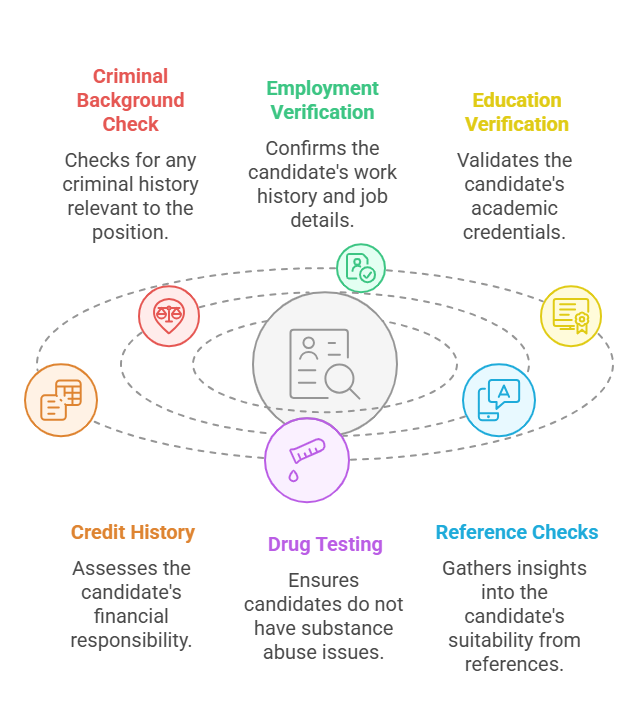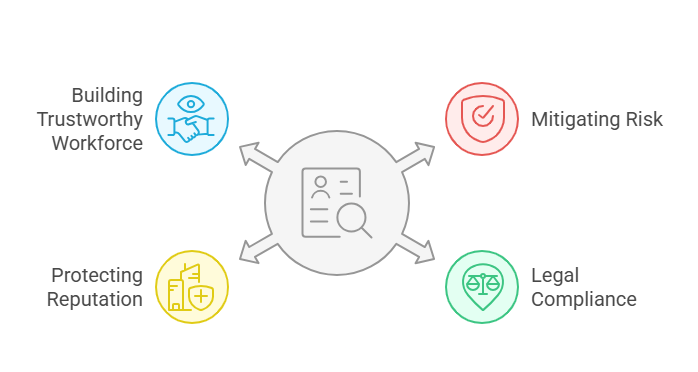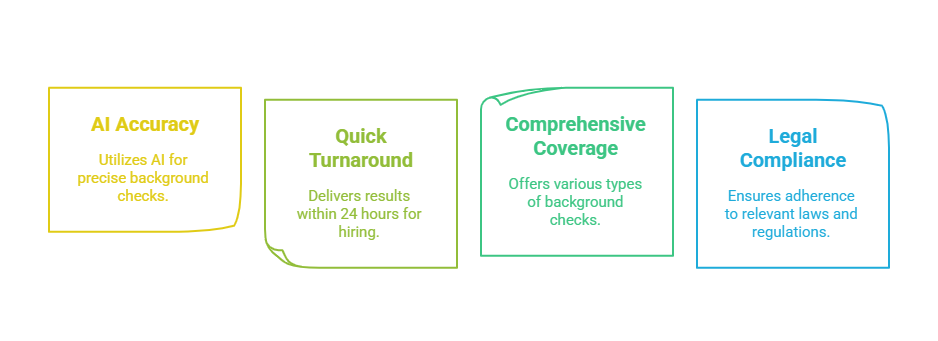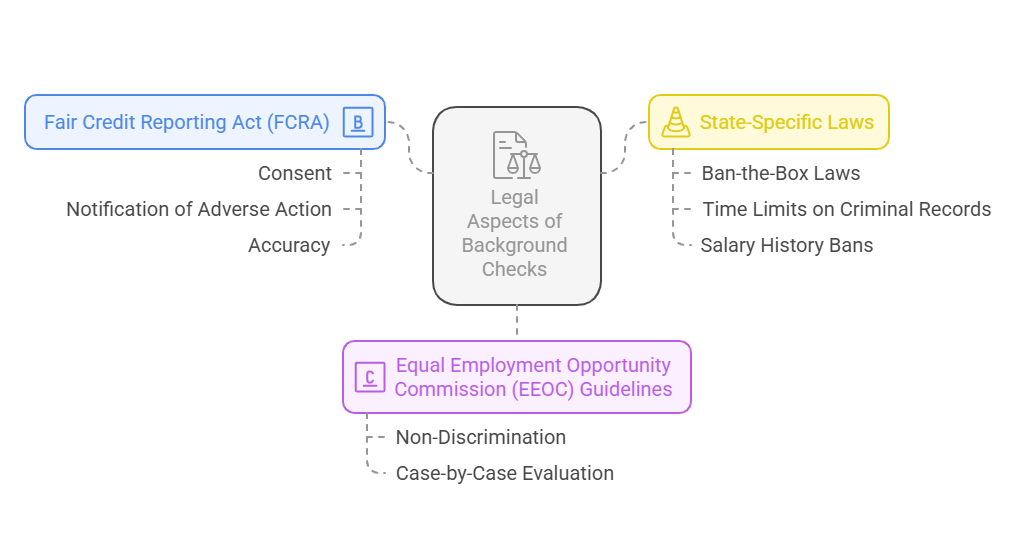Why HR Conducts Background Checks: A Comprehensive Guide for Candidates
Background checks have become an essential part of the hiring process in today’s fast-paced and competitive job market. Employers, especially HR departments, rely on background checks to ensure that the candidates they hire are trustworthy, qualified, and do not pose any risks to the organization or its employees. These checks help verify the candidate’s identity and ensure that their qualifications and history match the information provided during the hiring process.
Background checks are a critical tool for employers to make informed decisions. They not only help safeguard the company against fraud and misconduct but also help build a positive work environment by ensuring that all employees have the necessary qualifications and a clean record. As part of the increasing focus on compliance, HR departments use background checks to meet legal and regulatory requirements, reducing the risk of workplace issues.
Types of Background Checks Conducted by HR Departments

Background checks come in various forms, each designed to provide a detailed view of the candidate’s history. Here are some of the most common types of background checks HR departments conduct:
- Criminal Background Check Criminal background checks are crucial to determine if a candidate has any prior criminal history that could be relevant to the position they are applying for. These checks may include national, state, and local criminal records, and they can reveal any serious charges or convictions, such as theft, fraud, or violent crimes. HR departments often use criminal background checks to ensure that candidates do not pose a threat to the organization or other employees.
- Employment Verification Employment verification checks are designed to confirm the candidate’s work history. HR departments verify past job titles, employment dates, job duties, and reasons for leaving prior employers. This type of check is critical for ensuring the candidate’s experience is legitimate and aligning their qualifications with the job requirements.
- Education Verification Education verification checks are used to confirm a candidate’s academic credentials, including degrees, certifications, and qualifications. This check helps ensure that the candidate has the necessary educational background for the role they are applying for and that they have not misrepresented their qualifications.
- Credit History Credit history checks are generally used for candidates applying for positions that involve handling financial responsibilities. Employers may review the candidate’s credit history to assess their financial behavior and determine if they are financially responsible, which is crucial for roles such as accounting, banking, or finance.
- Drug Testing Drug testing is commonly conducted to ensure that candidates do not have substance abuse issues. For certain industries, especially those in safety-sensitive roles (such as construction, transportation, or healthcare), this is a critical check. Drug tests can also help ensure a safe work environment, reducing the risk of accidents due to impaired employees.
- Reference Checks Reference checks are typically one of the final steps in the hiring process. HR departments contact professional references provided by the candidate, such as former managers or colleagues, to gather insights into the candidate’s work ethic, skills, and overall suitability for the role. Reference checks provide additional confirmation of the candidate’s abilities and character.
Why Employers Need Background Checks

Employers conduct background checks for several reasons, most of which center around ensuring the safety, integrity, and efficiency of their organization. Here are some key reasons why background checks are necessary:
- Mitigating Risk and Preventing Fraud: Background checks can help identify potential risks related to a candidate’s criminal history, previous employment, or financial irresponsibility. Identifying these risks early helps employers avoid hiring individuals who might harm the business or others.
- Ensuring Legal Compliance: Many industries have regulatory requirements that necessitate background checks, such as healthcare, finance, and transportation. Employers must comply with these regulations to avoid legal penalties.
- Protecting the Reputation of the Company: A wrong hire can damage an organization’s reputation, affect employee morale, and lead to legal and financial consequences. Background checks help employers avoid making these costly mistakes.
- Building a Trustworthy Workforce: Background checks help ensure that candidates have the qualifications and skills they claim to have, and that they are trustworthy and dependable employees.
Data Table: Types of Background Checks
| Type of Background Check | Description | Importance for Employers |
|---|---|---|
| Criminal Background Check | Checks for any criminal history at national, state, or local levels. | Ensures safety and security within the workplace. |
| Employment Verification | Verifies past employment, job titles, and dates of employment. | Confirms the candidate’s experience and work history. |
| Education Verification | Confirms academic degrees and certifications claimed by the candidate. | Verifies qualifications and ensures candidate is academically qualified. |
| Credit History | Reviews the candidate’s credit history for financial responsibility. | Relevant for positions involving financial management or access. |
| Drug Testing | Tests for illegal substance use. | Ensures a drug-free workplace, especially in safety-sensitive roles. |
| Reference Checks | Contacts professional references to verify work ethic, skills, and performance. | Provides insights into the candidate’s behavior and competence. |
Comparison: RapidHireSolutions vs. Competitors in Background Screening
When it comes to background screening services, employers often have several options to choose from. The choice of a background check provider can greatly affect the quality, speed, and accuracy of the hiring process. One key factor that sets RapidHireSolutions apart from its competitors is its ability to provide quick, accurate, and legally compliant background checks that help employers make informed hiring decisions without unnecessary delays.
Here is a comparison table to highlight the key differences between RapidHireSolutions and other background check providers.
| Key Factors | RapidHireSolutions ✅ | Competitors ❌ |
|---|---|---|
| Speed of Results | Results within 24 hours | 15-20 days or more |
| Accuracy and Thoroughness | High accuracy with AI-driven technology | May have inconsistencies in reporting |
| Legal Compliance | Full compliance with FCRA, EEOC, state laws | May have gaps in compliance |
| Data Privacy and Security | Strong encryption and data protection protocols | May not ensure complete data security |
| Cost Effectiveness | Affordable pricing options | Often more expensive or with hidden fees |
As the table shows, RapidHireSolutions stands out in terms of speed, accuracy, and legal compliance. Competitors may have slower turnaround times, less consistent accuracy, or potential compliance issues, which can be detrimental to the hiring process.
Overview of RapidHireSolutions Services

RapidHireSolutions has developed a reputation for being a reliable and efficient background check provider, offering a variety of services tailored to the needs of employers and candidates. The company’s key offerings include:
- AI-Driven Accuracy: RapidHireSolutions uses artificial intelligence (AI) technology to process background checks with greater precision and speed. AI reduces human error, enhances the accuracy of results, and ensures that background checks are thorough and up-to-date.
- Quick Turnaround: Unlike many background check providers that take 15-20 days to deliver results, RapidHireSolutions is able to provide comprehensive background check results within 24 hours. This is especially important for employers who need to make hiring decisions quickly.
- Comprehensive Coverage: RapidHireSolutions offers a wide range of background checks, including criminal background checks, employment verification, education verification, drug testing, reference checks, and credit history checks. This allows employers to gather all the information they need for a holistic hiring decision.
- Legal Compliance: RapidHireSolutions ensures that all its background checks comply with the Fair Credit Reporting Act (FCRA), Equal Employment Opportunity Commission (EEOC) guidelines, and relevant state and local laws. This reduces the risk of legal complications for employers.
Turnaround Time Data Table
In addition to the differences in speed, another key factor to consider is the turnaround time for background check results. RapidHireSolutions delivers results in record time, allowing employers to act quickly, while many competitors can take weeks to complete the process.
| Provider | Turnaround Time |
|---|---|
| RapidHireSolutions ✅ | 24 hours |
| Competitor A ❌ | 15-20 days |
| Competitor B ❌ | 10-15 days |
| Competitor C ❌ | 3-4 weeks |
As shown in the table, RapidHireSolutions is the clear leader in terms of speed, delivering results within a single day. This can significantly improve the efficiency of the hiring process, reducing delays and helping employers secure top talent faster.
In-Depth Analysis: Pros and Cons of Background Checks
Background checks are crucial to ensuring that employers make informed decisions about potential hires. However, there are both advantages and challenges to this process. Let’s look at the pros and cons of background checks, especially in light of the services provided by RapidHireSolutions and its competitors.
Pros of Background Checks:
- Enhanced Hiring Accuracy: Background checks allow employers to verify the information provided by candidates. This helps confirm their qualifications, work experience, and criminal history, ensuring that employers hire individuals who are trustworthy and suitable for the role.
- Reduced Risk of Workplace Issues: By identifying red flags such as criminal activity or dishonesty, background checks help employers mitigate the risk of hiring individuals who may cause problems in the workplace. For example, hiring someone with a criminal history related to theft may prevent potential financial losses.
- Improved Employee Retention: A thorough background check helps employers ensure that they are hiring candidates who align with the company’s values and requirements. This can improve employee retention rates by ensuring a good fit from the start.
- Legal Compliance: Background checks help ensure that hiring practices comply with federal and state laws, such as those outlined by the Fair Credit Reporting Act (FCRA) and Equal Employment Opportunity Commission (EEOC) guidelines. This reduces the risk of legal complications for employers.
Cons of Background Checks:
- Potential for Delays: If not handled efficiently, background checks can slow down the hiring process. In many cases, competitors may take weeks to deliver results, which could result in delays and even losing out on top candidates. RapidHireSolutions addresses this concern by offering fast, 24-hour results.
- Inaccurate or Incomplete Information: Not all background checks are perfect. Errors or omissions in records, or outdated information, can lead to inaccurate results. This is particularly concerning when the information affects hiring decisions. However, RapidHireSolutions’ AI-driven technology helps ensure that background checks are thorough and accurate.
- Privacy Concerns: Candidates may be concerned about their personal information being exposed during background checks. HR departments and background check providers must handle this data with care. RapidHireSolutions employs strict data privacy and security protocols to ensure candidates’ information remains confidential.
- Cost: Some background check providers charge high fees or include hidden costs. For companies on a budget, these extra expenses can add up quickly. RapidHireSolutions offers competitive and transparent pricing to ensure that employers get the best value for their investment.
Legal Aspects of Background Checks
Background checks are not only essential for identifying potential risks but also necessary to comply with a variety of legal requirements. Employers need to ensure that their background screening process adheres to both federal and state regulations. Failing to comply with these regulations can lead to serious consequences, including lawsuits, penalties, or damages to the company’s reputation.

Key Legal Requirements for Background Checks
- Fair Credit Reporting Act (FCRA): The FCRA is one of the most important legal frameworks governing background checks in the United States. It dictates how employers can obtain and use a candidate’s background information. Some key provisions of the FCRA include:
- Consent: Employers must obtain written consent from candidates before conducting a background check.
- Notification of Adverse Action: If a background check results in a negative employment decision (such as not hiring the candidate), the employer must inform the candidate and provide a copy of the report.
- Accuracy: The information provided in background checks must be accurate. If a candidate disputes the information, employers are required to investigate and resolve any discrepancies.
- Equal Employment Opportunity Commission (EEOC) Guidelines: The EEOC enforces federal laws that prohibit employment discrimination. When conducting background checks, employers must be cautious to avoid discrimination based on race, color, religion, sex, national origin, age, disability, or genetic information. The EEOC advises employers to:
- Evaluate criminal history on a case-by-case basis, considering the nature of the crime, its relevance to the job, and how much time has passed since the conviction.
- Use background checks in a way that does not disproportionately affect any particular group of people.
- Ensure that decisions based on background checks are made in a consistent, non-discriminatory manner.
- State-Specific Laws: In addition to federal regulations, many states have their own specific laws regarding background checks. These laws can vary widely, and it is essential for employers to stay updated on the requirements in each state where they operate. Some common state-specific regulations include:
- Ban-the-Box Laws: These laws prevent employers from asking candidates about their criminal history on job applications. The goal is to give candidates a fair chance without being discriminated against before the interview stage.
- Time Limits on Criminal Records: Some states have laws that limit how far back an employer can look into a candidate’s criminal history. For example, certain states may only allow employers to consider convictions within the last 7 years.
- Salary History Bans: Some jurisdictions have laws that prevent employers from asking about a candidate’s previous salary history. This ensures that candidates are not unfairly underpaid based on their previous compensation.
By adhering to these laws and guidelines, HR departments can ensure that their background check process is both legal and fair to all candidates. RapidHireSolutions has a deep understanding of these legal requirements and ensures full compliance, giving employers and candidates peace of mind throughout the screening process.
FAQ Section
Here are some frequently asked questions about background checks and how they affect candidates in the hiring process:
Why do employers conduct background checks?
Employers conduct background checks to ensure that candidates are honest about their qualifications and history. They help verify the information on resumes, check for criminal records, validate employment and education history, and ensure that candidates are not involved in activities that could pose a risk to the company. Background checks are crucial for preventing fraud, misconduct, and workplace issues.
What information is typically checked during a background check?
Common components of a background check include:
-
- Criminal History: Checking if the candidate has any criminal convictions that might affect their suitability for the job.
- Employment Verification: Confirming previous job titles, durations, and reasons for leaving.
- Education Verification: Validating the candidate’s degrees and certifications.
- Credit History: In some cases, especially for positions involving financial responsibility, employers may check credit reports.
- Drug Testing: Some employers require candidates to pass a drug test before being hired.
How can candidates prepare for a background check?
Candidates can take several steps to prepare for a background check:
-
- Check Their Own Records: Candidates should review their criminal history, employment records, and credit reports to ensure there are no discrepancies before applying for jobs.
- Be Honest: Disclose any past issues that might show up in the background check, such as a criminal record, and explain the situation if necessary. Honesty is key to building trust with potential employers.
- Correct Mistakes: If there are inaccuracies in personal data, such as outdated addresses or misspelled names, candidates should correct them with the relevant authorities before applying.
How does RapidHireSolutions ensure the privacy of my background check?
RapidHireSolutions takes data privacy very seriously and uses advanced encryption and security protocols to protect candidates' personal information. The company follows strict industry standards for data protection, ensuring that all background check data is handled confidentially and securely.
What happens if something negative appears on my background check?
If a background check reveals negative information, such as a criminal conviction or employment gap, candidates have the opportunity to explain or dispute the findings. Employers are required to follow specific procedures before making an adverse decision based on the background check, including notifying candidates and allowing them to address any discrepancies. Candidates should provide context or clarification if necessary to demonstrate that they are a suitable fit for the job.
Conclusion
Background checks are a critical part of the hiring process. They provide employers with essential information to make informed decisions about candidates and ensure the safety, security, and integrity of the workplace. While the background check process can be daunting for candidates, it is important to view it as an opportunity to present oneself honestly and professionally. Candidates who are upfront about their backgrounds and take proactive steps to ensure that their information is accurate will have a better chance of succeeding in the hiring process.
RapidHireSolutions offers fast, reliable, and legally compliant background checks, ensuring that both employers and candidates benefit from a smooth, efficient hiring process. By understanding the types of background checks involved and the legal requirements, candidates can approach this process with confidence, knowing that their qualifications and background will be evaluated fairly and transparently.

